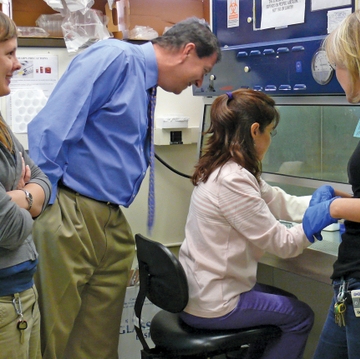Machine Learning Discovers Previously Unknown Genes in New UNM-Led Study

UNM nets $11 million for new biomedical research center
Cellular scrubbing could hold key to treating major diseases
The University of New Mexico School of Medicine has received a major five-year, $11 million federal grant to establish a center dedicated to the study of autophagy, a biological process that could hold the key to treating many diseases.
Autophagy helps cells with "house-cleaning" by removing or recycling damaged cell parts, such as organelles and proteins. When the process goes awry, it may cause or exacerbate inflammatory and metabolic disorders, including diabetes, obesity, cancer, autoimmune diseases, degenerative neurological conditions and aging.
"We at UNM are perfectly poised to investigate the fundamental aspects of these processes, their implications for various diseases and disorders, and their potential for treatments," says Vojo Deretic, PhD, chair of the Department of Molecular Genetics & Microbiology, who will lead the new AIM Center for Autophagy, Inflammation and Metabolism in Disease.
The AIM center is funded by the National Institutes of Health (NIH) as a Center of Biomedical Research Excellence. It will bring together a critical mass of researchers in the field, encouraging synergies among them, and provide mentoring for junior faculty to develop projects and achieve independent funding. AIM will also develop resources to support relevant research at UNM's Health Sciences Center, regionally and nationally.
Scientists have studied autophagy intensively over the past 50 years. The 2016 Nobel Prize in medicine was awarded to Japanese scientist Yoshinori Ohsumi for his pioneering role in understanding the autophagy process in yeast. A number of scientists, including Deretic, have identified similar but also more evolved systems in mammalian and human cells.
At UNM, Deretic's groundbreaking research into the role played by autophagy in inflammatory diseases and infections helped convince NIH that New Mexico should host a national center of excellence. His research group has made important discoveries in the field, including that the process of autophagy can eliminate intracellular microbes, such as the causative agents of tuberculosis and AIDS.
Deretic also uncovered the role of human gene IRGM in autophagy, highlighting links between autophagy and Crohn's disease. His accomplishments were reflected in his election as chair of the 2012 Gordon Research Conference on Autophagy, one of the premier international scientific gatherings on the subject. He is also organizing the 2019 Keystone symposium on autophagy, which he hopes will be held in Santa Fe.
Deretic completed his undergraduate, graduate and postdoctoral education in Belgrade, Paris and Chicago. He was a faculty member at the University of Texas and University of Michigan before joining UNM in 2001.